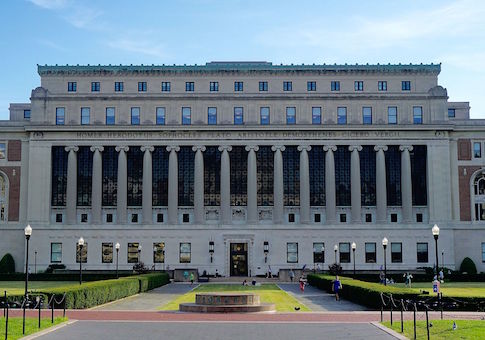A Columbia University comparative literature visiting professor's recent urging of universities to rethink their commitment to the First Amendment in light of "new technologies," such as video cameras, has prompted criticism from across the political spectrum.
Judith Butler, who teaches at the University of California-Berkeley, argued that "in a world of changing technology where incitement and harassment take on new forms," so-called "free speech absolutists" must understand that the First Amendment can "clash with other basic values," according to a blog post based on her remarks delivered at a panel on free expression at the UC-Berkeley earlier this month.
The gender theorist and passionate supporter of the academic boycott of Israel cited the trolling methods of fringe right-wing speaker Milo Yiannopolous, who has publicly mocked LGBTQ individuals during his campus appearances, as evidence for the need for widespread reform.
"Maybe we shrug our shoulders and say that this is expressive activity, but surely it crosses the line between expressive activity and threat; and that line was crossed in a new way—and is crossed all the time now in new ways—because of the way technology is now used to incite people to engage in cyber-bullying that did not exist before," wrote Butler.
"So the legal vocabulary we have for distinguishing expressive activity from actual threats, or an incitement to engage in illegal activity—those latter two are not protected as expressive freedoms under the First Amendment—changes when new technologies, or new uses of technology, produce new possibilities for incitement, harassment, and the commission of illegal activities," continued Butler.
If the First Amendment takes "precedence" over Title IX non-discrimination statutes "and every other community principle," she warned, "we should perhaps frankly admit that we have agreed in advance to have our community sundered, racial and sexual minorities demeaned, the dignity of trans people denied, that we are, in effect, willing to be wrecked by this principle of free speech, considered more important than any other value."
Opposition to Butler's vision of rewritten free speech principles was swift.
John K. Wilson, co-editor of the Academe blog where Butler's comments were published and author of multiple books criticizing conservative views, responded that "it seems absurd to claim that new 'technology' somehow turns mockery into a threat," and cautioned of the "enormous danger in announcing that the new technology of social media has moved the line of free speech."
"Incitement, harassment, and the commission of illegal activities have not changed their meaning because of the invention of the internet," he added. "It is possible for people to use new technology to more effectively inspire others to commit these crimes. But controversial figures have gotten threats by phone and by mail long before the invention of email, yet no one argued that the telephone should cause us to limit free speech."
"If we accept this new line, universities might ban a few Milos to make Butler happy, but they will also this as an excuse to ban leftist speakers and to fire professor after professor who offends someone by berating or offending political enemies on their personal social media accounts," wrote Wilson. "The message I have here is this: Don't bring a bazooka to kill a fly, and definitely worry about the collateral damage you might cause."
At the right-leaning Washington Examiner, Tom Rogan concluded that "most of Butler's speech was a meandering mess of faux-intellectual drivel," with a clear conclusion, "She is not an advocate of the First Amendment."
College social media and internet policies have become ubiquitous, with some schools expecting adherence online to student and staff codes of conduct, including anti-discrimination clauses.
A Rutgers University professor was punished this month for posting extensively on his personal Facebook page comments considered racist, sexist, and anti-Semitic.
Alternatively, the University of North Dakota found itself under fire last year when administrators explained that, as a public institution bound by the First Amendment, they could not prosecute students who published pictures of themselves in blackface.
Update Jan. 5, 2018, 11:16 a.m.: This post has been updated to note that Judith Butler is a visiting professor at Columbia. She is a full-time professor at the University of California-Berkeley.
